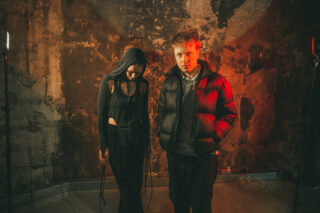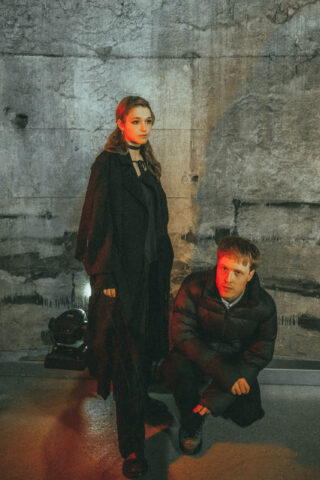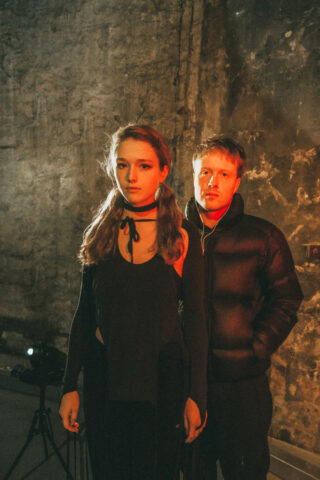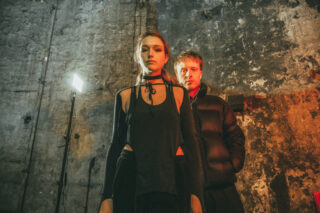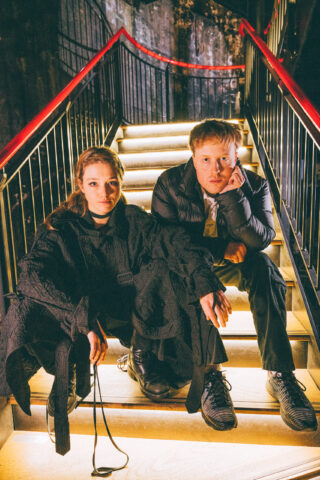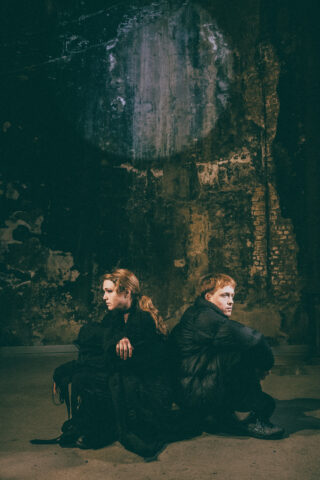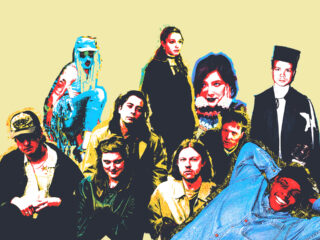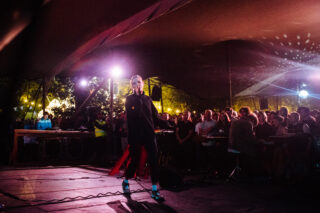I Love You Jennifer B, like the duo’s earlier music (most notably their 2020 EP Wicked City), spans a range of influences that encompass their personal music histories. The pair worked at this debut for two years, signing with Rough Trade some way through the process. The album deal feels like something of a full circle for the Jockstrap project. The A&R at Rough Trade was the first person in the music industry who had ever approached the pair to discuss music.
“It’s nice to come back around to them,” Taylor says. “Our manager was just doing what everybody does, which is sending stuff out to different people. And Rough Trade were the last people we sent the music to, I don’t know why. They really liked the music when we played it to them. You’ve just got to go where your gut is.”
The aesthetic of Jennifer B channels the theatrical energy of music theatre combined with the improvisational spirit of jazz, and this is reflected in the visual and atmospheric language of the music video for recent single ‘Concrete Over Water’. This whimsical, harlequin inspired production, for which Georgia worked closely with director Eddie Whelan to create a holistic world populated by complex and carefully-drawn characters, epitomises the distinct style for which the duo are becoming recognised. Unlike much recent music, the album appears unaffected by the specific conditions of the pandemic and the myriad wider socio-political disasters, and is deeply rooted in form and emotion, in a way that manifests as timeless.
“I think we would have made this no matter what,” Taylor tells me. “I don’t think [the pandemic] changed the music we’ve written. I’m not that, personally, motivated by specific things in the world, especially with music. Obviously, everything affects your music so I don’t have much of a choice, because it will do. But although during the whole process we were dealing with that, we weren’t really… it just sounds like what I thought it would sound like. It just took a bit longer, because things took a bit longer.”
“We’d never done anything so long – I found that was a challenge,” Georgia adds, “trying to hold all the songs in my head at the same time. I was determined to have a concept at the beginning.”
“I’m less into that,” Taylor says. “Georgia’s more into that, so we had to compromise. We had different things we wanted from the album. I’m less fussed. When I listen to music, I listen to it in the moment, I don’t think about context too much. And we didn’t want that. We wanted a bangers sort of thing – I mean,” he laughs, “we haven’t done that either.”

Perhaps the whimsical solemnity of some of the album tracks comes from the isolated manner of their collaboration, and its concurrent intensity. I do wonder how this duo, at the cusp of adulthood, have managed to navigate an intense and sometimes lonely collaboration with any semblance of social life.
“We feel like we’re working all the time,” the pair say in unison when I ask about how they manage to juggle an all-consuming collaboration, other music projects and a personal life.
“We’ve got quite a good work ethic,” Georgia says. “Music is our social life, our personal life, everything. Obviously, you know when you’re working and not, but we feel like we’re working a lot at the moment.”
Taylor shrugs. “It’s pretty half and half. Isolating when you’re not on tour and exposing when you’re on tour. That’s how I feel. We don’t see many people when we write music. And I do it in my bedroom as well so it’s very much… cool.”
I wonder if there’s a temptation to let loose and party now that the hard work of the album is over, and with a tour spanning the UK, Europe and US on the horizon. Then again, maybe the pitfalls of rock and roll excess aren’t all that luring for musicians genuinely driven by the music, and raised in the self-care generation.
“We’re quite sensible people,” Taylor says, “We’re both quite good at being aware of taking care of ourselves. We get massaged, we have steam rooms. It’s almost like music – it’s not a choice really. We’ve been like this since we met each other. We just need this to survive. We don’t really drink that much on tour. It’s not anything weak, it’s just that we’re into taking care of ourselves.”
Georgia sinks back in her chair. “I figured out really early on that I couldn’t cane it in the way I thought I would on tour. And I would really land in a mess if I did. It’s a job. Very quickly I was like, ‘Alcohol backstage? This is a job!’ It’s a lot more sustainable and enjoyable now.’
The light changes outside and we head into the street. “I can see why you’d do it,” Taylor says, of the temptations to go wild. “I felt that on the last tour. I found it very difficult to relax after each gig. And I could feel how a little something… I mean I’ve never taken drugs, so I don’t even know what that’s like, but I understand it and empathise with people who do it. There’s a reason why it’s happened forever.”




